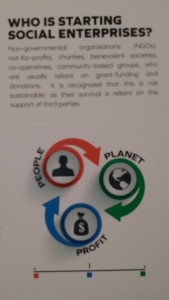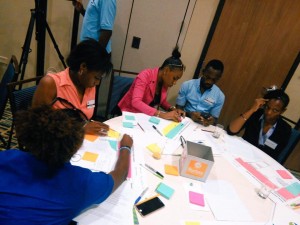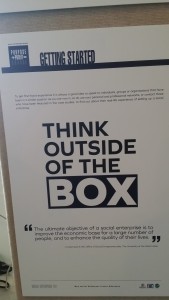
Strengthening Social Enterprise in Jamaica: A Tough But Worthwhile Task
July 20th, 2016
Chairman of the JN Foundation Earl Jarrett wants to see Jamaica as “a country agile and ready for growth.”
How is this to be achieved? Mr. Jarrett is looking at what they call a “two-pronged approach”: putting the institutional framework in place to make doing business easier (yes, there is still more work to be done in this area); and smoothing the way for growth at the micro level (which is where social enterprise comes in).

Who’s Starting Social Enterprises? NGOs, non-profits and community-based groups that usually rely on grant-funding. Time to become more self-sufficient!
In January 2015, I wrote on this blog about the JN Foundation’s efforts to support and help develop social enterprise in Jamaica. Recently, it launched the second phase of its Social Enterprise Boost Initiative (SEBI 2) under the theme The Business of Sustainable Development. SEBI 2 has continued funding assistance from USAID Jamaica, which has shown real commitment to the initiative from the start.
The Planning Institute of Jamaica (PIOJ) will is also providing much-needed support on the policy side. This is significant; the PIOJ recognizes that social enterprise fits right in with the goals of Jamaica’s Vision 2030 and its corresponding pillars of the Community Renewal Programme. It also points to the importance of research, monitoring and evaluation, adherence to global best practices and various types of training – including access to capital, technology and markets – all essential for the growth of social enterprises. These businesses have a great deal to offer, to their own communities and to the national economy – but they also need an infusion of practical skills, energy and “know-how.”
It still seems hard to define social enterprise in the Jamaican context. The Foundation has arrived at its own working definition, for now: an enterprise that is community-based and where the profits are reinvested into the business. But the concept needs to be researched and honed into one that is generally acceptable and meaningful.
So, how and why did this admirable concept lose its appeal? Mr. Jarrett observed wryly, “Somewhere along the line, it became old-fashioned…It was no longer good to be good.” However, in these challenging economic conditions, the JN Foundation believes social enterprise is now more relevant than ever. It is especially important in areas where public services are lacking; but while it does support the public good, it is not a charity. It is a business, and like every business an eye must be kept on the bottom line. As one participant observed, “We have our children to look after, too!”
During its first three-year phase, JN Foundation’s General Manager Saffrey Brown reports, 29 micro enterprises were formed. 130 community members found employment, and 720 were impacted. Fifteen new products and services were launched and approximately J$37 million in revenue generated. The Foundation’s army of volunteers provided more than 2,000 days of support, valued at around J$6.3 million.
So from now until December 2017, fifteen new and diverse social enterprises, plus six strong ones from the first phase, will take their places in the SEBI incubator. The SEBI 2 enterprises include Petals and Roots, started by the Mensana group to provide income for those living with mental illness; Young Men and Women of Purpose, who focus on mentorship and career-planning for young people through mobile apps and web-based tools; the Montego Bay Marine Park, with its Reef Guardians and educational tours; and more that you will hear about in the coming weeks. They will be joined by success stories from the first phase, like the Ulster Spring Women’s Group, Mustard Seed Communities and Dress for Success.
The JN Foundation would like to see SEBI stand on its own feet. Sustainability is more than a buzz word – it is a critical component of economic survival in an increasingly tough and competitive environment. Climate change is already affecting productivity, and is here to stay. Government resources will continue to be stretched. The world economy is under stress.
So these enterprises have no choice; they will need to “toughen up.” They will need to build resilience, while offering quality products and services and maintaining the highest ethical standards. While it is hoped (and expected) that Government will put in place an enabling environment for micro business generally, social enterprises will need to develop the self-belief as well as the “smarts” to succeed. JN Foundation and its partners have faith in the twenty-one enterprises it is supporting; I believe also that they will go far.
I wish them the best of luck, and hope they are ready for the hard work ahead!
You can find much more information on SEBI Jamaica online here. Find them on Facebook (SEBI Jamaica); and on Twitter @SEBIjm. You can also subscribe to the SEBI Jamaica YouTube channel, which has some inspiring videos. Support social enterprise in Jamaica, wherever and whenever you can!
Tags: Climate Change, Community Renewal Programme, Earl Jarrett, entrepreneurs, JN Foundation, Mensana, micro enterprise, Montego Bay Marine Park, MSME, Petals and Roots, Planning Institute of Jamaica, Saffrey Brown, SEBI, small and medium-sized enterprises, Social Enterprise Boost Initiative, sustainable development, training, USAID, Vision 2030, volunteerism, Young Men and Women of Purpose
The Gleaner reserves the right not to publish comments that may be deemed libelous, derogatory or indecent.
To respond to The Gleaner please use the feedback form.
- We Are the Zoomers
- Living Online with Humans and Birds: NAOC 2020
- Human Trafficking and the Problem of Public Education
- Down Memory Lane
- Are We Ready to Recover from COVID-19?
- Road Safety Matters: Is Your Vehicle Safe?
- Sexual Harassment, Me Too, and the Minister’s Disturbing Giggle
- The Vulnerable Senior Citizens, Private Care Homes and COVID-19
- A Muddle Over Masks
- Here is Something Life-Saving You Can Do: Give Blood!




